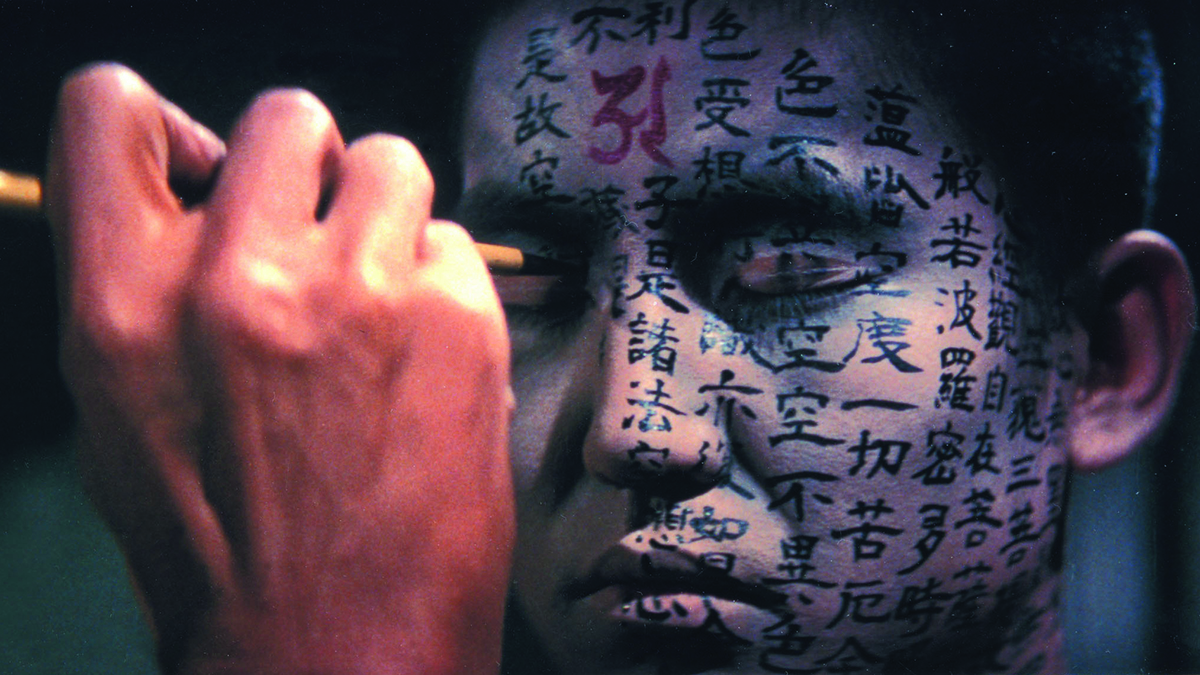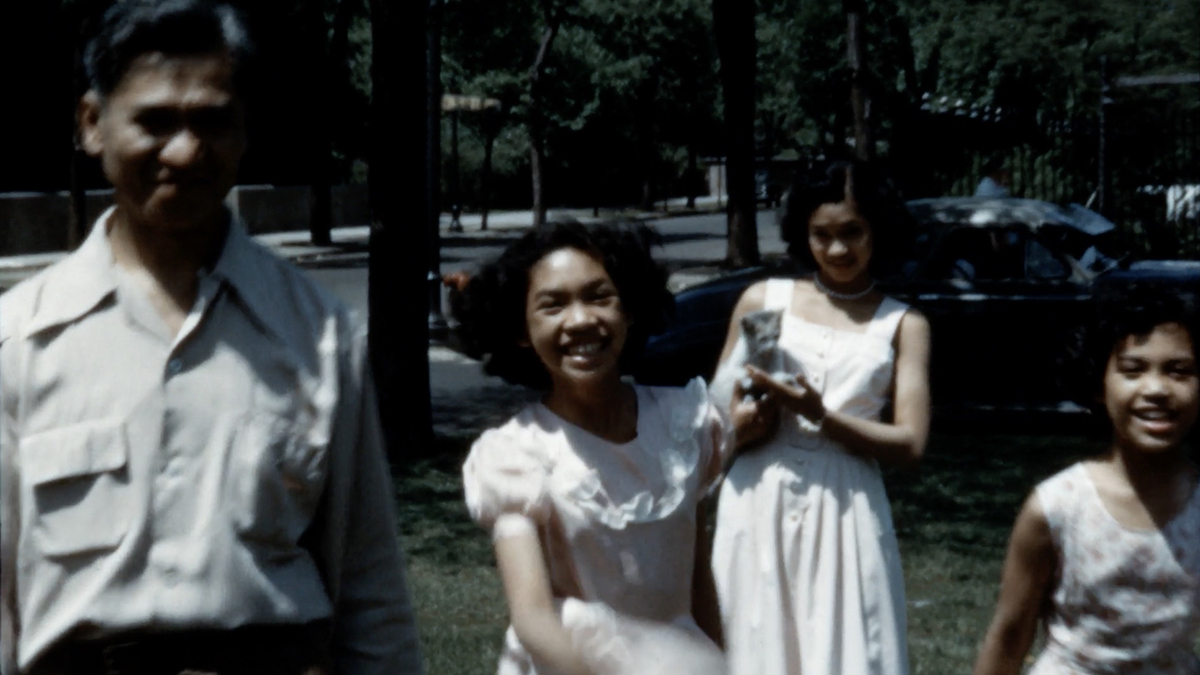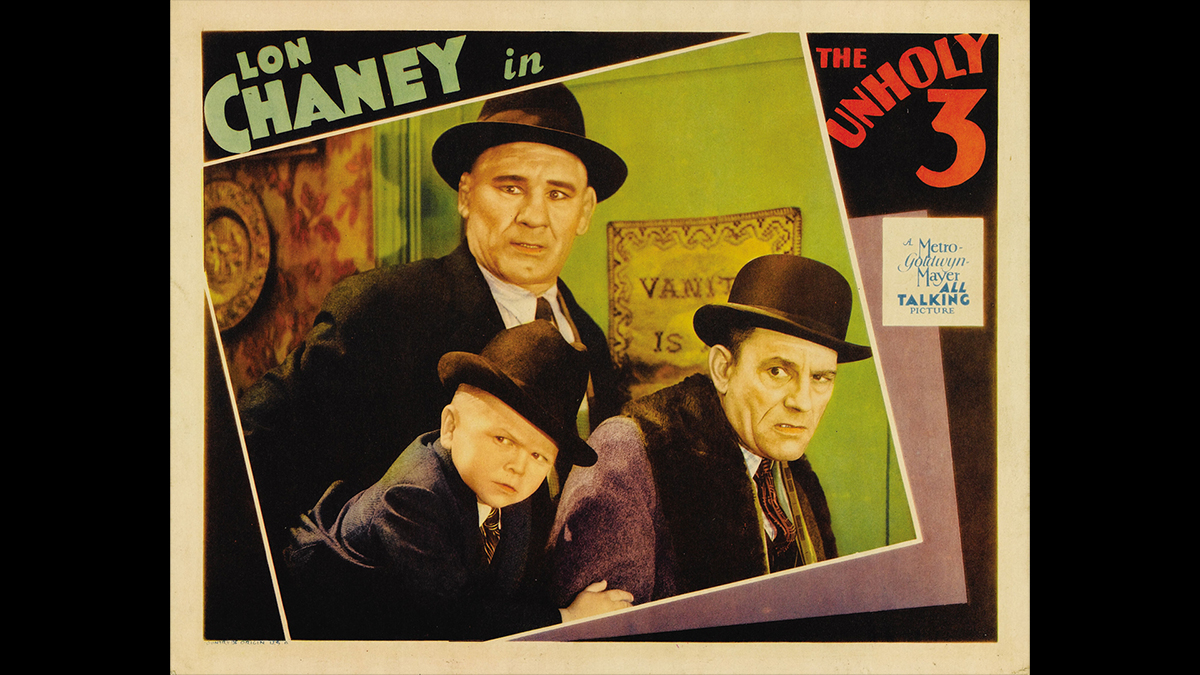Our screenings are held at multiple venues around Chicago. This season you can find us at:
• The Music Box Theatre
3733 N Southport Ave — Directions • Parking
Tickets: $11 – $15
• The Gene Siskel Film Center
164 N State St — Directions • Parking
Tickets: $13
• The Reva and David Logan Center for the Arts (Film Studies Center)
915 E. 60th St., Chicago, IL 60637 — Directions • Parking
Free Admission
• Constellation
3111 N Western Ave — Directions • Parking
Tickets: $15
Want to attend our screenings but having financial hardships? Contact info@chicagofilmsociety.org
SEASON AT A GLANCE
September ▼
Sun 9/14 at 11:30 AM
Blind Husbands ………. Music Box
Thu 9/18 at 6:00 PM
Cookie’s Fortune ……….. Film Center
Tuesday 9/23 at 7:00 PM ………. Music Box
Chris + Heather’s Big Screen Blowout #2
October ▼
Thu 10/9 – Sun 10/12
CELLULOID NOW
Sun 10/19 at 8:45 PM ………. Music Box
Parents
Fri 10/24 at 7:00 PM ……….. Logan Center
Little Man, What Now?
November ▼
Sat 11/1 from 11:00 AM to 3:00 PM
Home Movie Day ………. Chicago History Museum
Thu 11/6 at 8:00 PM ………. Constellation
Jazz and Blues Films from the Bob Koester Collection
Sun 11/9 from 2:00 PM to 9:00 PM
Chicago Film Society Open House
Tue 11/11 at 7:00 PM ………. Music Box
Butch Cassidy and the Sundance Kid
Sun 11/16 at 11:30 AM ……… Music Box
Every-Night Dreams
Tue 11/25 at 6:00 PM ……….. Film Center
Fear of Fear
December ▼
Mon 12/1 at 7:00 PM ………. Music Box
Kwaidan
Wed 12/10 at 8:00 PM ………. Constellation
Films from the Filipino American Historical Society of Chicago
Fri 12/16 at 6:00 PM ………. Film Center
The Unholy Three
☆ Add the schedule to your google calendar
☆ Sign up for our newsletter for screening reminders!
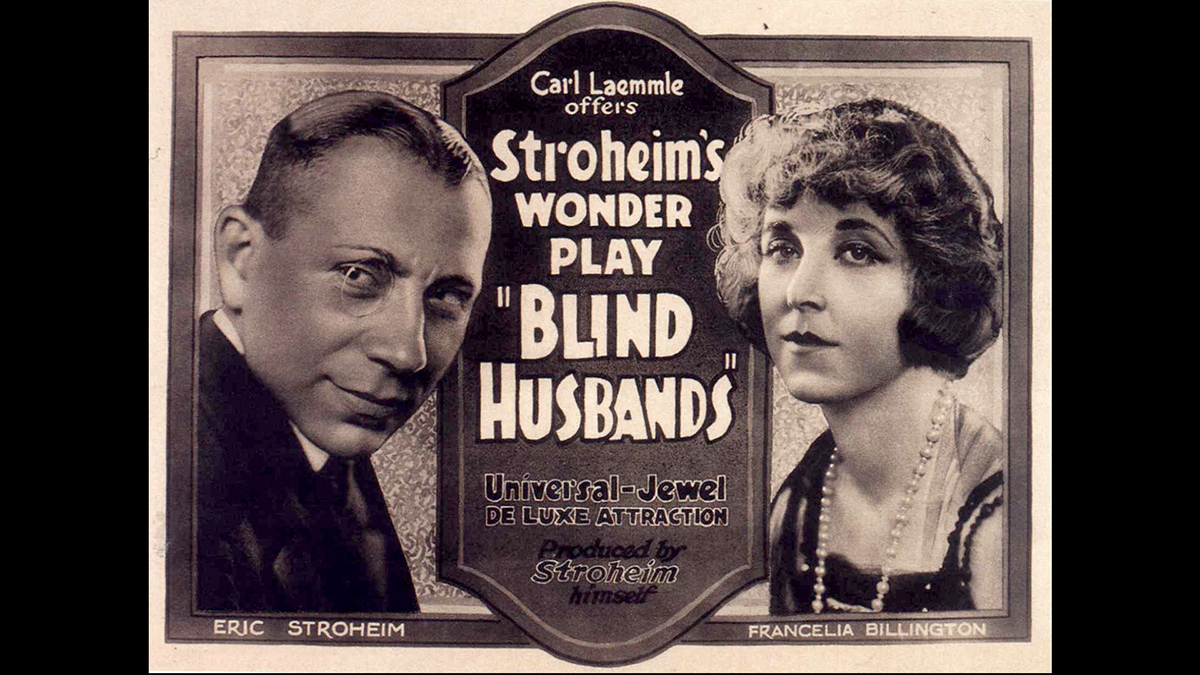
Sunday, September 14 @ 11:30 AM
Music Box Theatre / Tickets $12
BLIND HUSBANDS
Directed by Erich von Stroheim • 1919
The Armistice marked not only the cessation of World War I, but also the cessation of films that cheered on the conflict and fanned the flames of national hatred. No actor had sunk his teeth into these anti-German roles as ravenously as Erich von Stroheim, who in one infamous propaganda film not only raped a woman but threw a baby out of a window in the process. How might such an artist survive in post-war Hollywood? Stroheim pivoted to writing and directing, offering his services to Universal, bundled with his acting at a bargain rate, complete with a surefire scenario he had already worked out in every detail while (allegedly) imprisoned in an Austrian military fortress. The result was Blind Husbands, which concerns a love triangle between a wealthy American couple (Sam De Grasse and Francelia Billington) and an Austrian army officer (guess who) in the resort village of Cortina d’Ampezzo in the Tyrolean Alps, the “Mecca of American tourists” lovingly recreated on the studio backlot. (An early intertitle sums up Stroheim’s sympathies in these marital disputes: “Guilty! says the world condemning ‘the other man’ … But what of the husband?”) Despite greatly outspending his initial budget, Stroheim delivered such a substantial critical and commercial hit that Universal eagerly gave him another shot behind the camera, and the rest is history. An atmospheric and foreboding drama, Blind Husbands remains among the key moments of sustained self-creation in silent cinema. One measure of the myth: the opening credits insinuate that Blind Husbands was adapted ‘from the book The Pinnacle by Erich von Stroheim.’ Of course, there was no such book. (KW)
93 min • Universal Film Manufacturing Co. • 35mm from Universal
Preceded by: “Screen Snapshots No. 10” (1922) – 3 min – 35mm from San Francisco Film Preserve
Live musical accompaniment by David Drazin
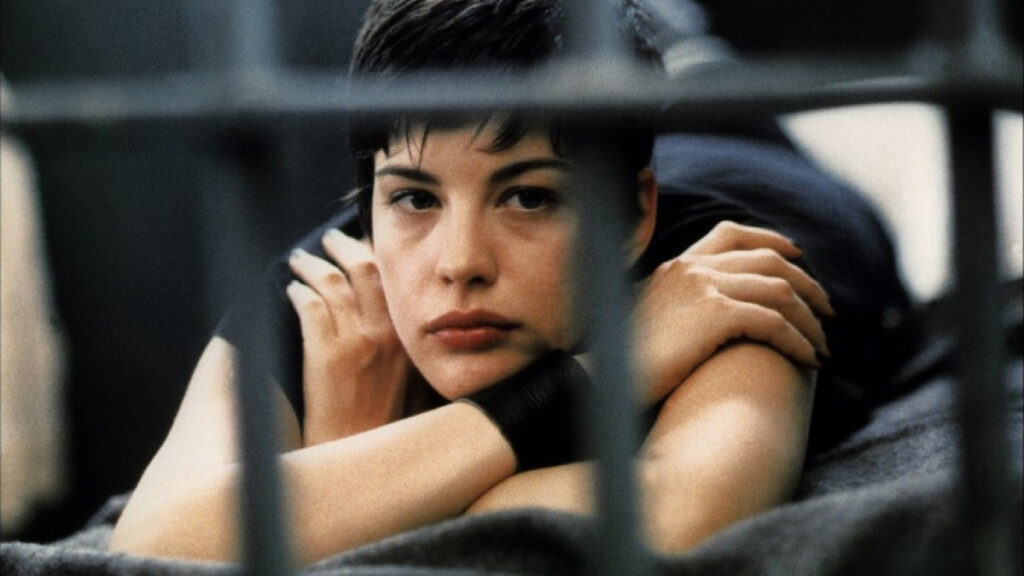
Thursday, September 18 @ 6:00 PM
Gene Siskel Film Center / Tickets: $13
COOKIE’S FORTUNE
Directed by Robert Altman • 1999
Look out, Reno: the biggest little city in the world may, in fact, be Holly Springs, Mississippi, home to the catfish enchilada and a boisterous extended family that revolves around widowed matriarch Jewel Mae “Cookie” Orcutt (Patricia Neal). Everyone knows everyone else and amicably marinates in everyone’s business — until Cookie is found dead from a gunshot wound. Cookie’s niece Camille (Glenn Close) can’t help embellishing the crime scene for dramatic impact, much as she feels called to improve upon Oscar Wilde for the Easter production of Salome that she’s directing at the First Presbyterian Church. The sheriff (Ned Beatty) half-heartedly detains Willis (Charles S. Dutton), Cookie’s live-in handyman and crossword puzzle collaborator, but can’t seriously believe his own fishing buddy would be capable of murder. Emma (Liv Tyler), Cookie’s grand-niece and the undisputed parking ticket queen of Marshall County, knows Willis is innocent and bears witness by camping out in his jail cell, which is, not inconveniently, a few paces from the Coke machine that’s the sturdiest headboard in town for trysts with her sheriff’s deputy boyfriend Jason (Chris O’Donnell). A neglected entry in Altman’s sprawling filmography, Cookie’s Fortune starts with a Southern Gothic set-up but delivers something closer to a rakish, pastel-colored Sunday morning comic strip. Altman’s career does not lack for sprawling ensemble pieces festooned with sociological detail, but this one might be the first that’s downright friendly, a spring breeze that swirls through Holly Springs and goes down like a glass of Wild Turkey. (KW)
118 min • Moonstone Entertainment • 35mm from Universal
Preceded by: Robert Altman trailer reel – 10 min – 35mm
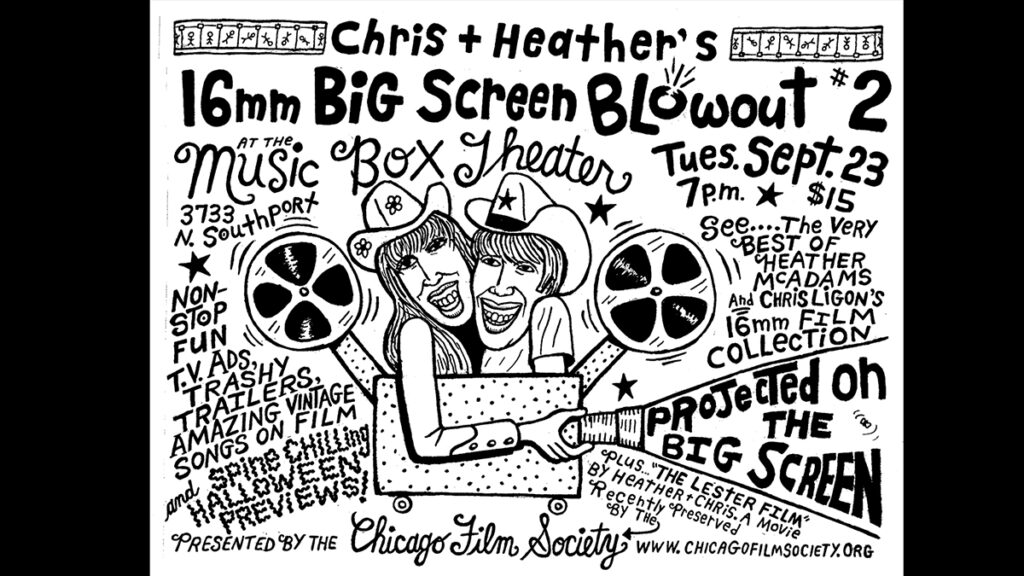
Tuesday, September 23 @ 7:00 PM
Music Box Theatre / Tickets: $15
Chris + Heather’s Big Screen Blowout #2
CFS continues its bid to secure “national treasure” status for Heather McAdams and Chris Ligon by offering up the Music Box’s large screen for another orgiastic evening of small-gauge confections from the Renaissance eccentrics’ extensive film collection. Known throughout Chicagoland as masterminds and hosts of the long-running “Country Calendar Show” (and its ancestor, the “Record Roundup Film Jamboree”), Chris and Heather have (since last year’s Big Screen Blowout I) unearthed many more nuggets from their goldmine of 16mm arcana. This includes vintage trailers for films like Diary of a High School Bride, Battle of the Amazons, Shock Corridor, Cotton Pickin’ Chicken Pickers, and The Night Evelyn Came Out of the Grave; forgotten TV commercials for wacky toys like Water Wiennie, Super Elastic Bubble Plastic, and Dream Date; sensational songs by The Byrds, Sugar Chile Robinson, Steppenwolf, Peggy Lee, The Royal Teens, and more; plus a newly restored print of Chris and Heather’s 1995 “The Lester Film,” a portrait of Chicago club scene crossdresser/artist/therapist Lester Brodzik (aka Lestushka). Naturally, the vivacious duo will appear live on stage to introduce the evening festivities. Highly recommended for fans of 20th century American weirdness, drive-in culture, chugging beers in the parking lot, sitting quietly in the library, knitting, true love, drinking coffee at night, or simply being alive on this magical planet. (GW)
Approx 90 min • 16mm from Chris and Heather’s collection
“The Lester Film” has been preserved by the Chicago Film Society with funding from the National Film Preservation Foundation.
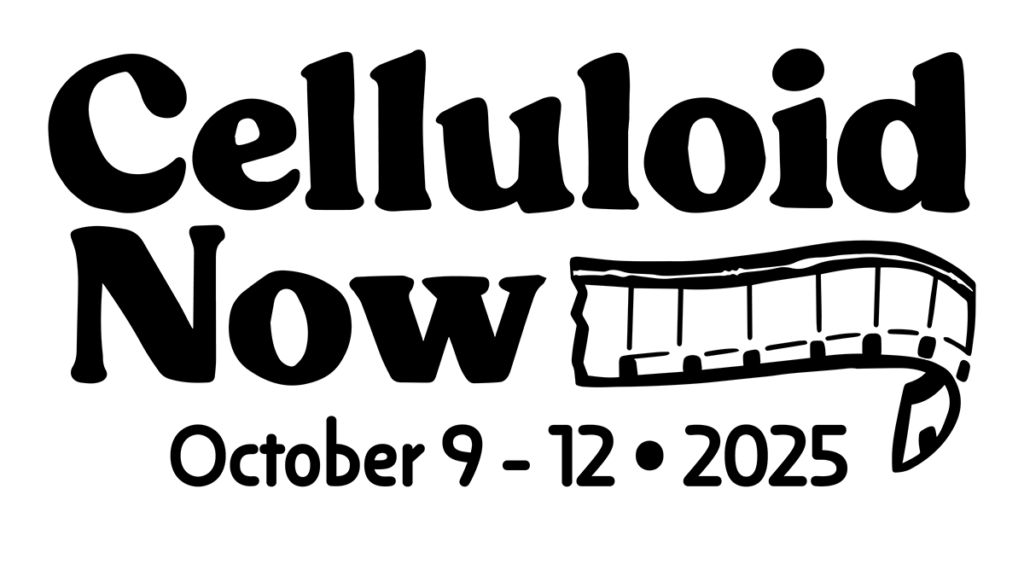
Friday, October 9 – Sunday, October 12
Celluloid Now
The Chicago Film Society is proud to present a third edition of Celluloid Now: four days of screenings, workshops, expanded cinema performances, and other events showcasing the recent work of analog filmmakers and artists, alongside archival rediscoveries and restorations.
For full program details, visit celluloidnow.org
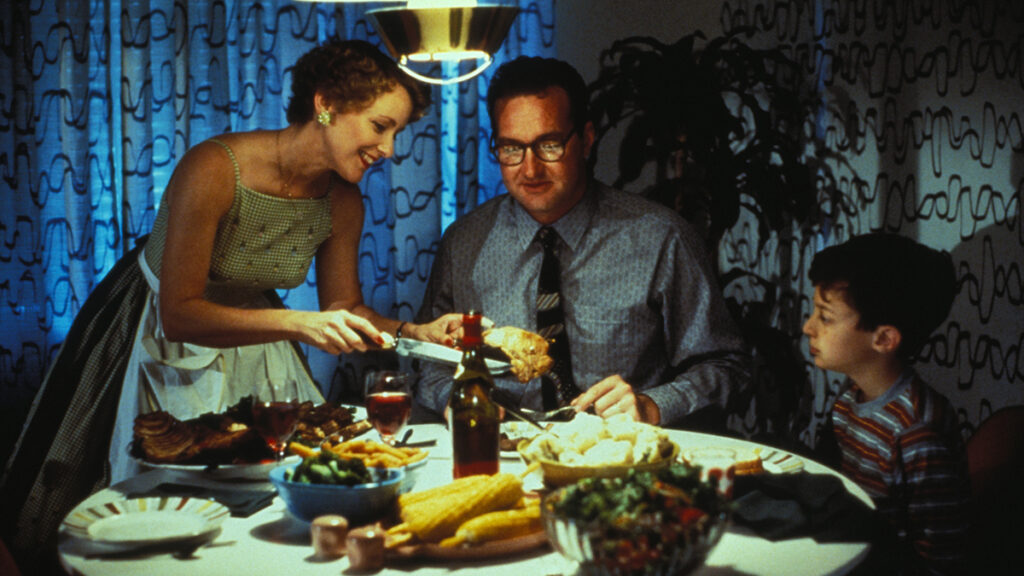
Sunday, October 19 @ 8:45 PM
Music Box Theatre / Tickets: $11
PARENTS
Directed by Bob Balaban • 1989
Have you ever suspected — or fantasized — that your parents aren’t what they seem? Ten-year-old Michael has. Maybe they’re into eating human flesh, or maybe he just walked in on them having sex. Maybe they’re committing murder to satiate their bellies, or maybe this is just 1950s California life. This kind of thinking is just normal kid stuff, right? Bob Balaban’s surreal big-screen directorial debut is an offbeat treatment of one of horror’s more unsettling tropes: a secret clan of cannibals trying to win recruits into their way of life. In the tradition of late-80s suburban paranoia tales where the kid protagonist is alternately ignored and gaslit at every turn, Parents twists a layer of intergenerational mistrust around a core of terror wrapped in black humor. Randy Quaid, embodying chaotic suburban normalcy gone rotten as Michael’s daddy, was nominated for an Independent Spirit Award for his role, but Parents wasn’t widely appreciated until decades later, when film writers and academics rediscovered the riches of Reagan-era horror. The sealed Vestron VHS release of Parents will run you over $300 on eBay, but you can enjoy this slice of sick horror history on 35mm for just twelve bucks with us. Roger Ebert naysayed the film, mistaking its strength for weakness, wondering “Is this a horror movie? Or a psychological comedy about the secret fears of children?” Perhaps it’s both! Or neither. We’ll let you be the judge. (TV)
81 min • Vestron Pictures • 35mm from the American Genre Film Archive, permission Lionsgate
Preceded by: “Fetal Pig Anatomy” (Heather McAdams, 1989) – 7 min – 16mm
This short subject was preserved by the Chicago Film Society with funding from the National Film Preservation Foundation
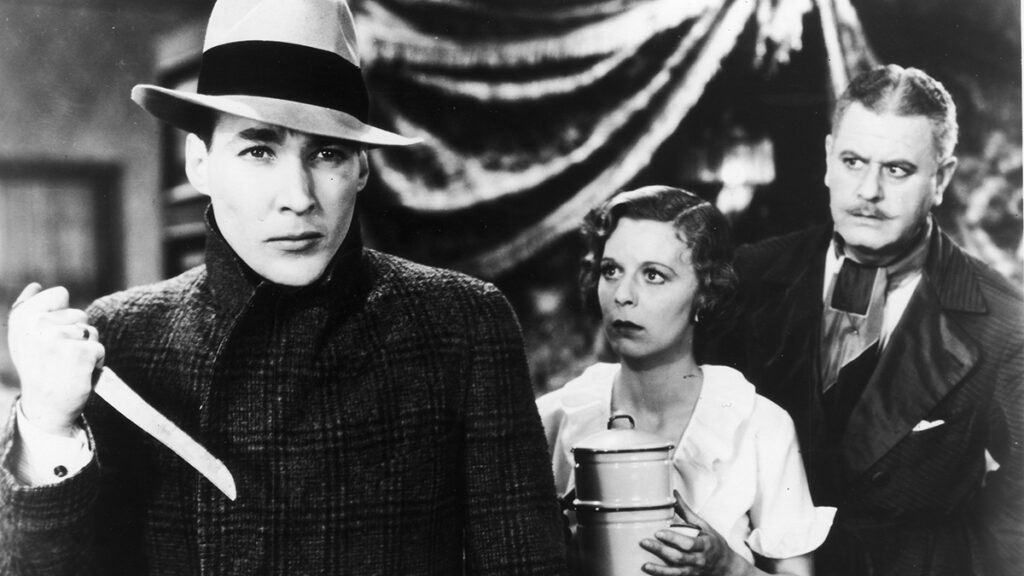
Friday, October 24 @ 7:00 PM
Film Studies Center / Tickets: FREE
LITTLE MAN, WHAT NOW?
Directed by Frank Borzage • 1934
Universal Pictures founder Carl Laemmle was never shy about his affection for German subjects, but even by the studio’s standard, Little Man, What Now? might sound today like a perversely uncommercial, socially critical outlier. Yet this hardscrabble chronicle of bookkeeper Pinneberg (Douglass Montgomery) and his pregnant wife Lämmchen (Margaret Sullavan) struggling to stay afloat in the last days of Weimar Germany was based on an acclaimed novel by Hans Fallada, which had topped the New York Times best-seller list for three weeks in 1933 and had even been a Book of the Month Club selection in its English translation. Pinneberg’s futile efforts to hold down a job expose the fissures of Weimar society: caught between the capricious abuses of the small family firm, the quota-mad efficiency of the modern department store, and the inscrutable rules of an illicit underground economy operating in plain sight, the young family begins to contemplate radical solutions to their plight. Communism? Nudism? Everything’s on the table in Frank Borzage’s deeply romantic, deeply funny, gauzily beautiful screen adaptation. Released mere weeks before Hollywood began enforcing the Production Code, Little Man, What Now? radiates an effortlessly earthy carnality: Montgomery and Sullavan sleep in the same bed, and when he proclaims “I love my wife!” in a moment of erotic exultation, his trad declaration sounds genuinely sexy. No wonder Little Man, What Now? was among the first films condemned by the Legion of Decency upon its formation. (KW)
98 min • Universal Pictures • 35mm from Universal
Preceded by: “1934 Fox Movietone News” – (1934) – 10 min – 35mm
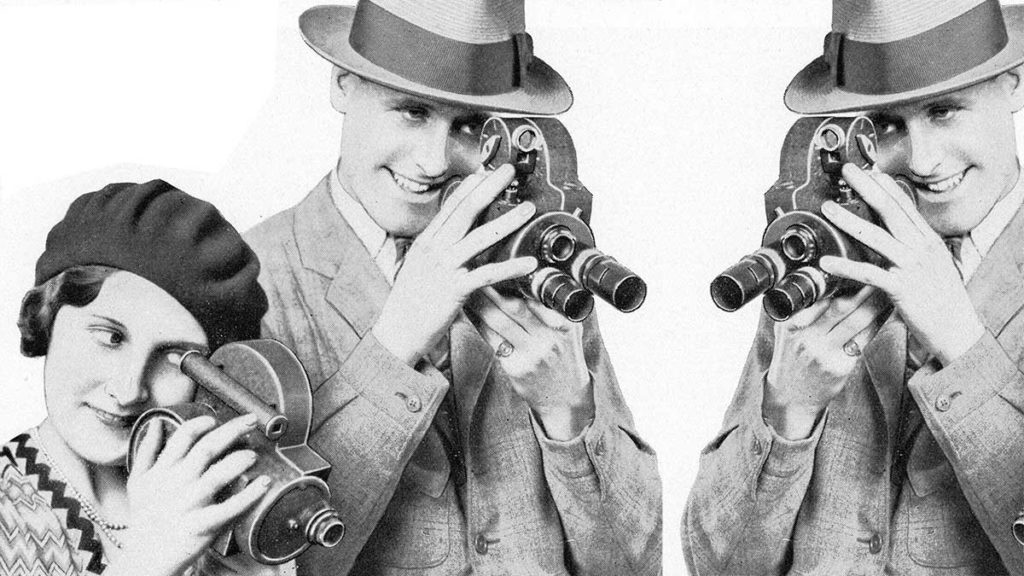
Saturday, November 1 from 11 AM to 3 PM
Chicago History Museum / FREE
CHICAGO HOME MOVIE DAY
Drop in between 11 AM and 3 PM and archivists and projectionists will be on hand to inspect and project a selection of YOUR celluloid home movies in 16mm, 8mm, or Super 8. No films to share? Feel free to just sit back and enjoy the show! Presented by Chicago Film Archives, Chicago Film Society, & the Chicago History Museum.
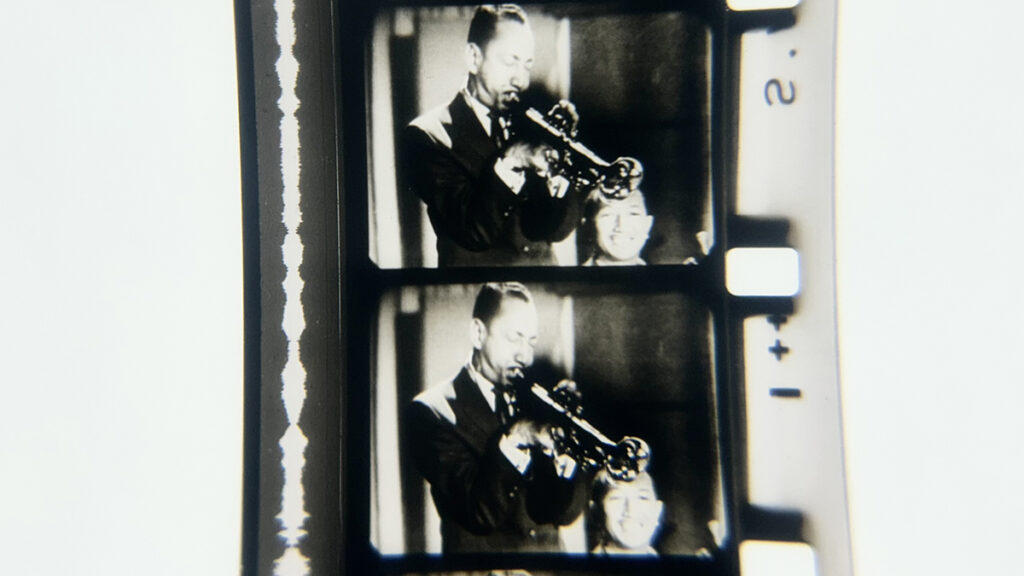
Thursday, November 6 @ 8:00 PM
Constellation / Tickets: $15
International Sweethearts of Rhythm: Jazz and Blues Films from the Bob Koester Collection
In 2023, CFS received a donation of several hundred reels of 16mm film from the family of Bob Koester (1932–2021). Bob was a film collector and regular presence at Chicago repertory film screenings, but he was best known as the founder of Delmark Records and as owner of the legendary Jazz Record Mart. Compiled over the course of several decades, his film collection reflects a lifetime in the music business and his deep love for jazz and blues. Many Chicagoans remember Bob’s marathon screenings at Jazz Record Mart and at the Jazz Institute of Chicago’s annual Jazz Fair. He also traveled to jazz festivals around the country to present films from his collection, and opened his home to anyone who expressed interest in his Friday night movie screenings. We’ve spent the last couple of years winding through the reels to identify and inspect each film, and we’re finally ready to continue Bob’s tradition by inviting you over for a screening. The show includes performances by everyone from Louis Armstrong and Ethel Waters to Freddie & Flo, Slap & Happy, and Snap & Snappy; rare music documentaries, cartoons, and more! It’s the Chicago Film Society’s honor to be the new home of this collection, and to be able to pay tribute to Bob’s passion by screening these prints once again. (JA/TV)
Approx 90 min • 16mm from CFS collections
Full Program Details
REEL 1
• Dizzy Gillespie and His Orchestra: “Salt Peanuts”
Excerpt from the 1947 music review feature Jivin’ in Be-Bop.
• Cab Calloway: “Reefer Man”
Excerpt from the 1933 musical International House.
• Dorothy Dandridge and Cee Pee Johnson: “Swing For Your Supper”
Soundies Distributing Corporation, 1941; print circa 1942.
• Fats Waller: “Your Feet’s Too Big”
Directed by Warren Murray, 1941; print circa 1947.
• “New Orleans: The Big Easy”
Excerpt from a 1985 documentary produced by Made to Order Library Productions.
• Gertrude Niesen: “Jim”
A Movie News Reels release; print circa 1947.
• The International Sweethearts of Rhythm: “Jump Children” Anna Mae Winburn, vocalist.
Soundies Distributing Corporation; print circa 1942.
• Louis Armstrong and His Band: “I’ll Be Glad When You’re Dead, You Rascal, You”
Official Films Release, 1953; print circa 1953.
• Harry the Hipster Gibson; print circa 1953.
• Henry “Red” Allen and his band with J.C. Higginbotham: “Drink Hearty”
Directed by William Forest Crouch, 1946; print circa 1946.
— INTERMISSION! —
REEL 2
• TV Gospel Time: Episode 34
Featuring Brother Joe May and the Davis Sisters Choir of Philadelphia, PA; original Kinescope print circa 1963-1965.
• Henry “Red” Allen and his band with J.C. Higginbotham: “House on 52nd Street”
Directed by William Forest Crouch, circa 1946.
• Tony Pastor and His Orchestra: “Don’t Worry About Strangers”
Snader Telescriptions; print circa 1951.
• “Hen Hop” Made by Norman McClaren, 1942; Kodachrome print circa 1954.
• Freddie & Flo, Slap & Happy, and Snap & Snappy: “Rug Cutters Holiday”
Soundies Distributing Corporation, 1943; print circa 1943.
• “Clarence M Tap Dance Number” Print circa 1951.
• Betty Boop and Cab Calloway in “Snow White”
Fleischer Studios, 1933; print circa 1976.
• Sister Rosetta Tharpe with Lucky Millinder and his Orchestra: “Four or Five Times”
Soundies Distributing Corporation, 1941-1942; print circa 1952.
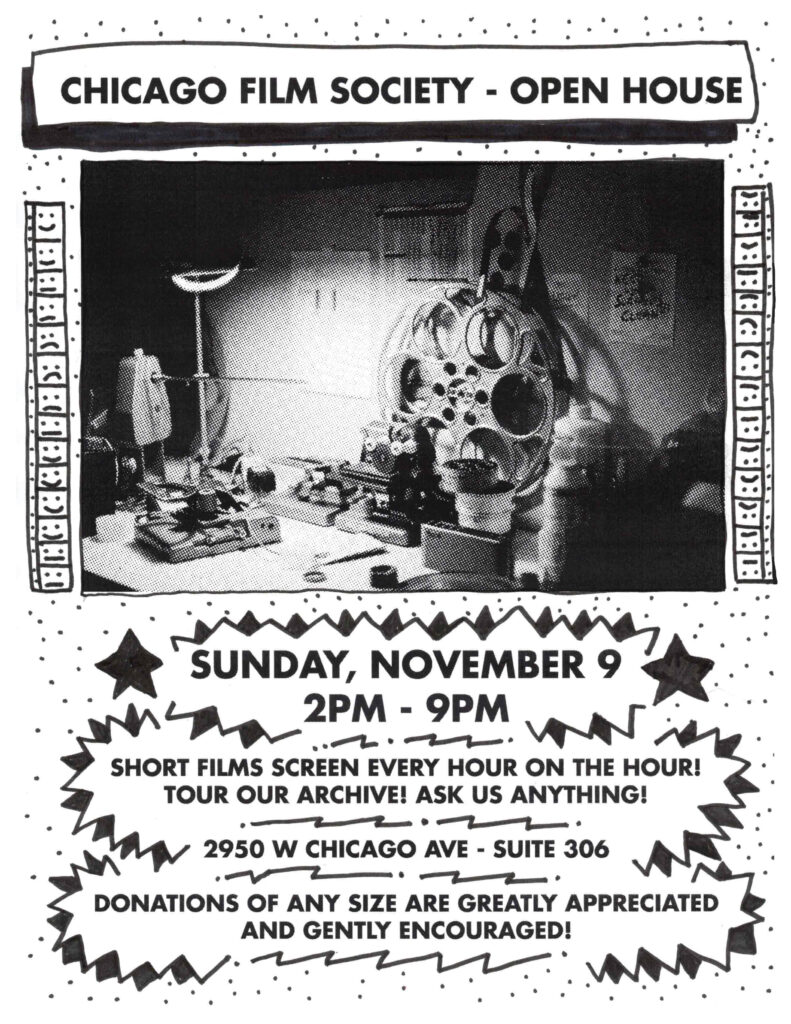
Sunday, November 9 from 2pm – 9pm
Chicago Film Society Office (2950 W Chicago Ave, Suite 306)
CFS OPEN HOUSE
Join us for a FREE (donations appreciated) open house where short films from our collection will be screened on the hour, every hour! Tour our archive! Ask us questions! There will be snacks! Drop in and drop out (and drop in again) at any point between 2pm and 9pm.
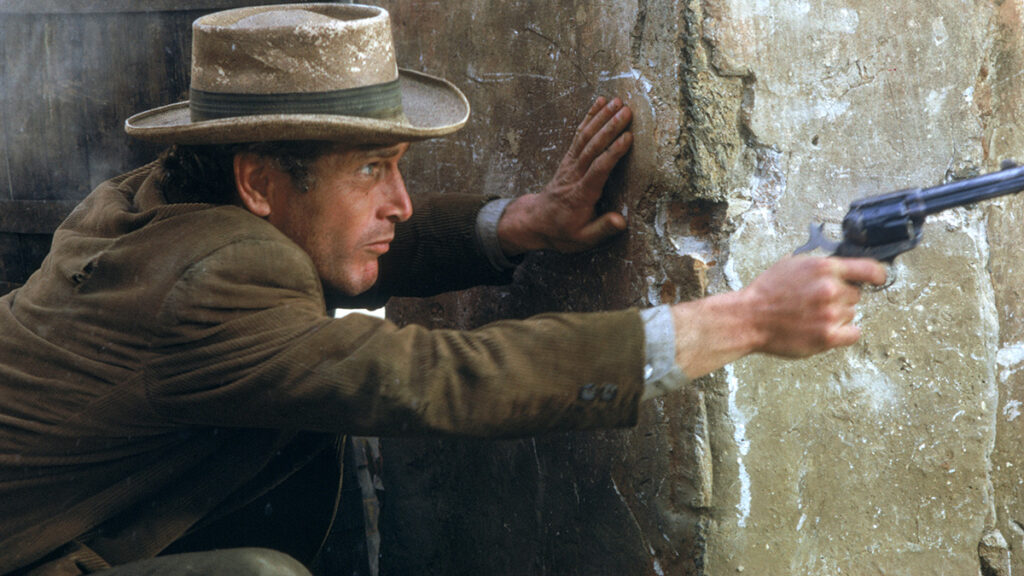
Tuesday, November 11 @ 7:00 PM
Music Box Theatre / Tickets: $11
BUTCH CASSIDY AND THE SUNDANCE KID
Directed by George Roy Hill • 1969
Two roaming bandits reject modernity and hold on tight to their saddles — they would never flee their foes on something as newfangled as a bicycle. Adapted (loosely) from true events, Butch Cassidy and the Sundance Kid was shot and released the same year as the moon landing, an occurrence that would have thoroughly shaken the film’s protagonists. As the 20th century dawns over Wyoming, Butch Cassidy (Paul Newman, cool and blue-eyed) and the “Sundance Kid” (Robert Redford, warm-blooded and flaxen-haired) attempt to escape the aftermath of a messy train robbery sparked by the twosome’s growing irrelevance after Butch is ousted as leader of their gang. Newman and Redford’s cumulative star power is as bright as the sun; they are as beautiful as they are effective as the best of friends. (The actors would reunite with director George Roy Hill in 1973’s megahit The Sting.) However, their brilliance is not solely responsible for the film’s success: Butch Cassidy was scripted with great care by novelist-turned-first-time-screenwriter William Goldman (Marathon Man, The Princess Bride). Goldman’s all-consuming, years-long obsession with the life and times of the real-life bandits paid off; his airtight script, stuffed with zingers and full of pathos, won the Academy Award and launched a career as Hollywood’s screenwriting It Boy for most of the freewheeling 1970s. (RIN)
110 min • 20th Century-Fox • 35mm from Criterion Pictures USA
Preceded by: “Lonesome Cowboy” (Toney W. Merritt, 1979) – 0.5 min – 16mm from Canyon Cinema
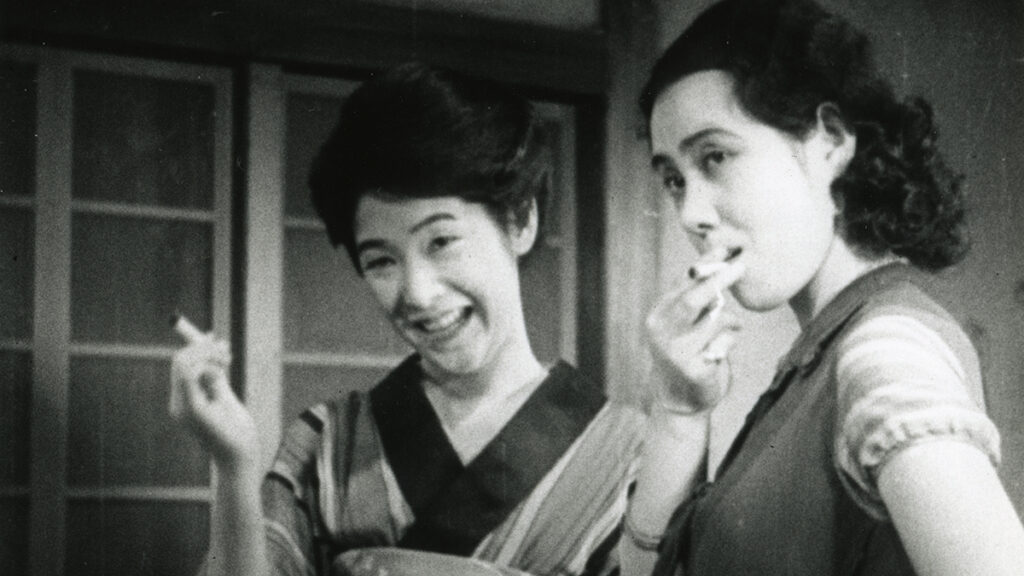
Sunday, November 16 @ 11:30 AM
Music Box Theatre / Tickets: $12
EVERY-NIGHT DREAMS
Directed by Mikio Naruse • 1933
Mikio Naruse’s career spanned the 1930s late-silent era up through the time of color film and anamorphic widescreen. His interest in the professional and domestic lives of modern working women in Japan was a constant throughout the dozens of films he worked on, reaching as far back as Every-Night Dreams, one of Naruse’s earliest surviving features. Sumiko Kurishima, one of the first major screen stars in the Japanese film industry, stars as bar hostess Omitsu, toughing out single motherhood after being abandoned by her husband Mizuhara. After a three-year absence, Mizuhara suddenly returns as a supposedly reformed man ready to care for his family, only to create more problems for them through his weak and ineffectual constitution. While the subject is squarely in his wheelhouse, Naruse’s visual style in Every-Night Dreams is unusual in his filmography for its bombastic approach, finding myriad opportunities to echo Omitsu’s tumultuous home life with nervy push-ins and ominous dolly movements. (CW)
65 min • Shochiku Kamata • 35mm from National Film Archive of Japan, permission Janus Films
Preceded by: “Up and Down the Waterfront” (Rudy Burckhart, 1946) – 8 min – 16mm from Canyon Cinema
Live musical accompaniment by the MIYUMI Project Japanese Experimental Ensemble. Sponsored by Asian Improv aRts Midwest

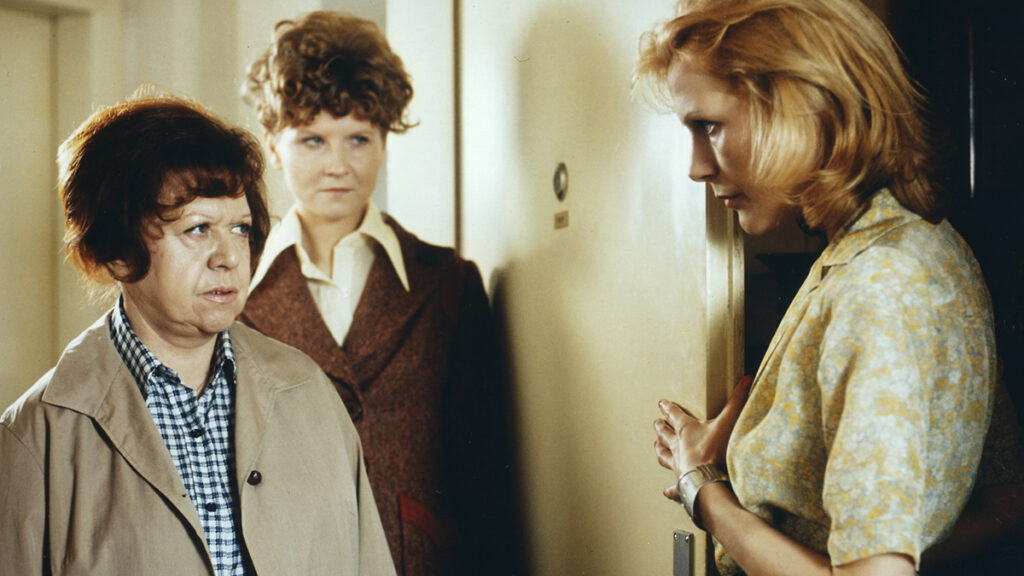
Tuesday, November 25 @ 6:00 PM
Gene Siskel Film Center / Tickets: $13
FEAR OF FEAR
Directed by Rainer Werner Fassbinder • 1975
In German with English subtitles
Fear eats the soul, sure — but where does it come from? Throughout the mid-1970s Fassbinder paid repeated homage to the then-maligned “women’s pictures” of his hero, German émigré Douglas Sirk. Passions that roiled just beneath the surface in Sirk’s films became open wounds in Fassbinder’s acerbic treatments — sometimes operatically so but always retaining a layer of compelling inscrutability. In this lesser-known work from his florid middle period, originally made for television, the madman of Munich continued to explore the terror of domestic alienation. Margit Carstensen, a Fassbinder regular (who memorably came unglued as RWF’s titular anti-heroines Martha and Petra Von Kant) here portrays Margot, a put-upon, Valium-popping housewife who drifts into a kind of nameless psychological torture during her second pregnancy. Life around her moves along like a horrifying dream, one whose meaning Margot is somehow not allowed to plumb; professional help proves sorely unhelpful. The source of the “angst” is not explicit, but should be familiar to us all — a buzzing, a harshness, a sense that things are not as they should be. A terror of madness and the inevitability of its overtaking us. A clue: in a 1971 essay on Sirk’s melodramas, Fassbinder offered, “Women think in Sirk’s films. Something which has never struck me with other directors… Usually women are always reacting, doing what women are supposed to do, but in Sirk they think. It’s something that has to be seen. It’s great to see women think. It gives one hope.” (GW)
91 min • Westdeutscher Rundfunk • 35mm from Janus Films
Preceded by: “House Cleaning Blues” (Dave Fleischer, 1937) – 6 min – 16mm
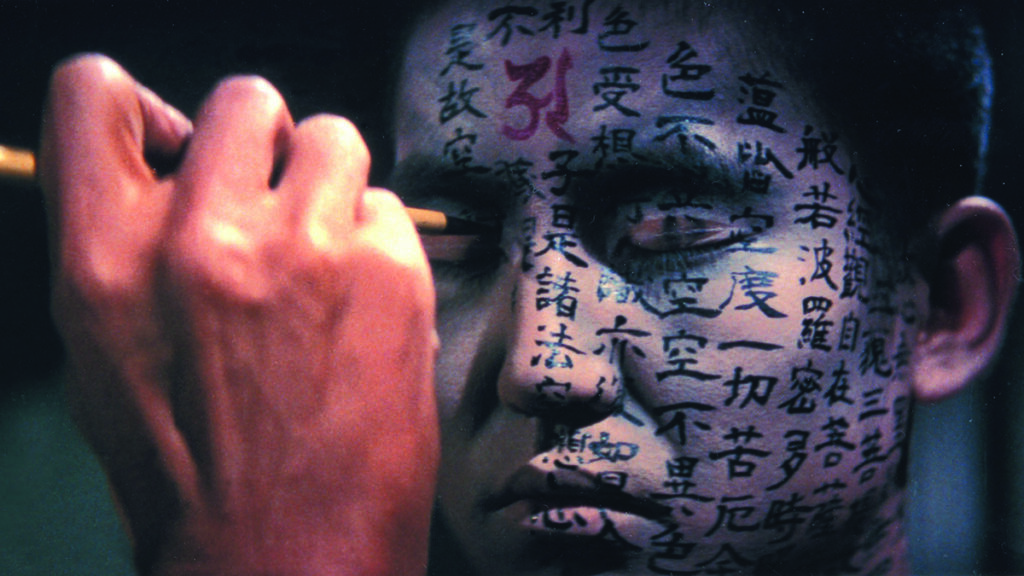
Monday, December 1 @ 7:00 PM
Music Box Theatre / Tickets: $11
KWAIDAN
Directed by Masaki Kobayashi • 1964
In Japanese with English subtitles
Spirits in the drinking water, stolen ears, crabs with human faces: such are the endless wonders of Kwaidan. Masaki Kobayashi (Harakiri, The Human Condition) helmed this supernatural anthology film based on Kwaidan: Stories and Studies of Strange Things, a 1904 collection of Japanese folktales from Lafcadio Hearn, a Greek-Irish writer and renowned proponent of Japanese culture in the West. At the time of its release Kwaidan was the most expensive Japanese film ever made, and it seems to have been worth every penny. Extraordinary sets built inside an empty airplane hangar were intertwined with transcendently beautiful hand-painted backdrops, shimmering optical effects, and an expressionistic score composed by the great Tōru Takemitsu – in keeping with the cultural ping-pong between Japan and author Hearn, Takemitsu was inspired by American avant-garde composer John Cage. In the centerpiece story, “Hoichi the Earless”, a man questions his friend about whether or not spirits of the sea are real: “For those who believe, they are. For those who don’t, they aren’t.” CFS will be screening the 161-minute international export cut of the film, the only version available in the US on 35mm. For those who believe, this visually overwhelming and aurally hypnotizing film must be seen on film, in the cool dark of the theater, the place where spirits dwell. For those who don’t, the three-hour version is available to stream at home. (RL)
161 min • Toho • 35mm from Janus Films
Preceded by: “L’Eye” (Xander Marro, 2005) – 3 min – 16mm from the filmmaker
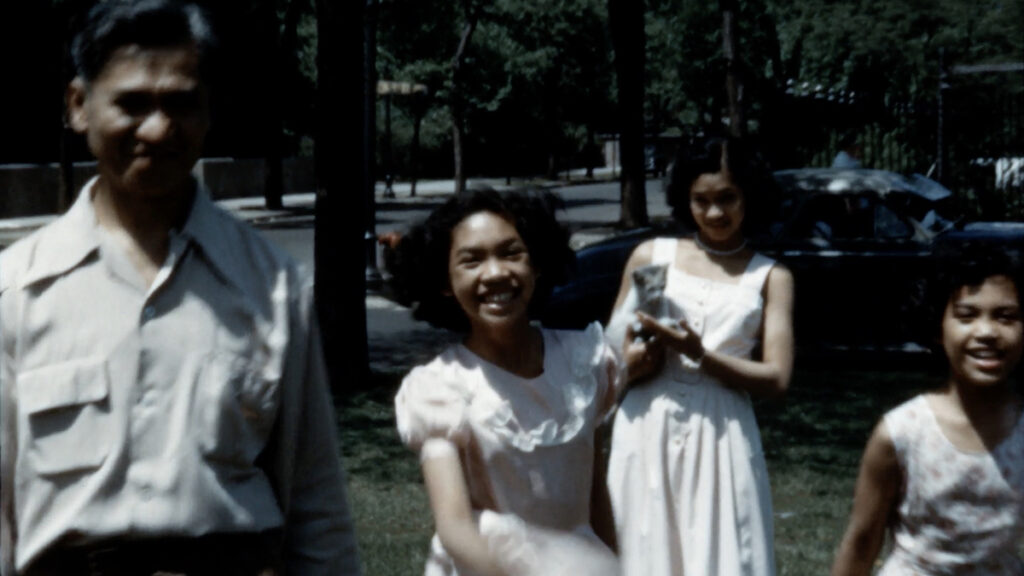
Wednesday, December 10 @ 8:00 PM
Constellation / Tickets: $15
Uncle Nick and the Chicago All-Stars:
Newly Preserved Films from the Filipino American Historical Society of Chicago
Nicholas G. Viernes (1902–1991) migrated to the US from the Cagayan Valley region of the Philippines in 1926 and, after a stint as a farmworker, settled in Chicago, where he worked as a pipefitter for General Motors. He also became a dedicated amateur filmmaker and community documentarian, shooting hundreds of 16mm reels that capture Filipino diasporic life with sensitivity and affection. On both Kodachrome and vivid black-and-white reversal stocks, his films animate an underrepresented history of migrant social club picnics and baseball leagues, thriving multiracial families, and everyday life in the city and country. Today, his films live in the collections of the Filipino American Historical Society of Chicago (FAHSC), founded in 1986 by Viernes’s niece Estrella Ravelo Alamar (1936–2022). The FAHSC has been working to inspect, catalog, and preserve “Uncle Nick’s” films so that they can be seen again. The Chicago Film Society has been involved with this project since 2019, providing film inspection training for FAHSC volunteers and working closely with FAHSC Collection Manager Ashley Dequilla to advocate for the collection. We are pleased to present five of Viernes’s earliest films, recently preserved on 16mm by FAHSC with support from the National Film Preservation Foundation: Little Farmers of Reynoldsburg (1936), Chicago All-Stars (1939), Calumet Park (1939-1951), Chicago of Today (1936), and Reynoldsburg Pt. 2 (1937). This program will be accompanied by an all-vinyl Original Pilipino Music soundtrack curated by Les The DJ. (JA/RFH)
Approx 80 min • 16mm from the Filipino American Historical Society of Chicago
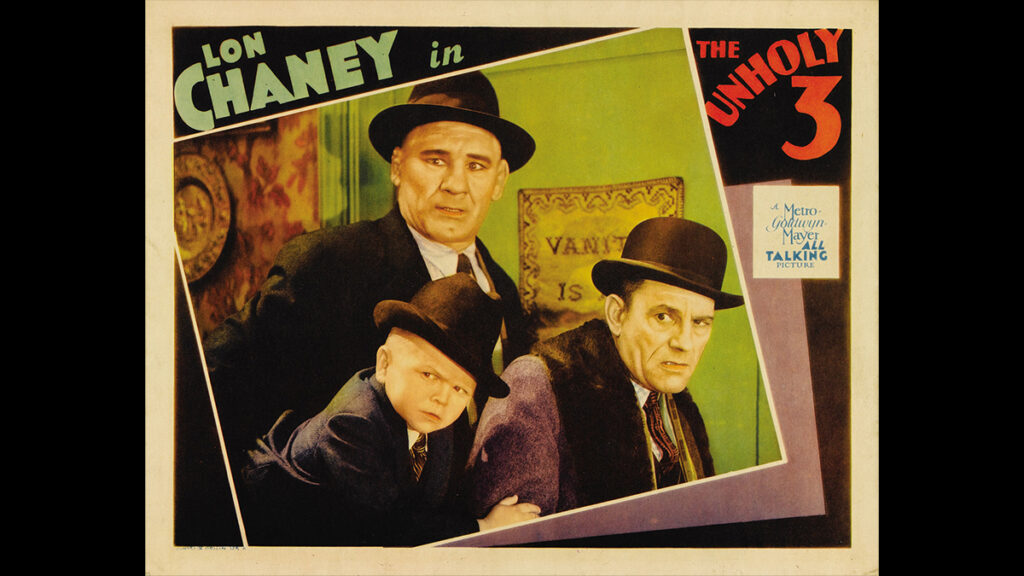
Tuesday, December 16 @ 6:00 PM
Gene Siskel Film Center / Tickets: $13
THE UNHOLY THREE
Directed by Jack Conway • 1930
When sound cinema arrived, nobody in Hollywood had a clear picture of how it would develop as a technology or as a business. Studios were forced to experiment with production strategies and often tailored projects to talent unaccustomed to having their speech recorded. For M-G-M, experienced vaudeville player Lon Chaney was one of the surest bets they had for weathering this transition. The studio decided to play it safe for Chaney’s talking debut with a remake of one of the actor’s biggest pre-sound hits, the Tod Browning-directed The Unholy Three (1925). Chaney was enlisted to reprise the role of malevolent ventriloquist and disguise artist Dr. Echo (a perfect showcase for the actor’s impressively malleable voice). While traveling with an itinerant sideshow, Dr. Echo recruits meathead strongman Hercules (Ivan Linow) and belligerent little person Tweedledee (Harry Earles, also returning from the 1925 film) in a criminal enterprise involving the trio posing as a family of pet shop proprietors. Echo leads the business in old-lady drag as “Grandma” O’Grady, while Hercules poses as his son-in-law and Tweedledee pretends to be The Baby, grotesquely puling for visitors and calling his toy elephant “my cow.” Things spin out of control for the Unholy Three after a botched Christmas Eve robbery draws the attention of the authorities, spurring Echo to hole up in a remote cabin with his partners in crime, his girlfriend, and his pet gorilla, all to the significant detriment of the group’s sanity. Chaney died of throat cancer a month after The Unholy Three was released, leaving it as the only speaking role of his career. (CW)
72 min • M-G-M • 35mm from Park Circus
Preceded by: “Let’s All Go to the Circus” (Encyclopedia Britannica, 1949) – 8 min – 16mm
Programmed and Projected by Julian Antos, Becca Hall, Rocío Irizarry Nuñez, Rebecca Lyon, Tavi Veraldi, Kyle Westphal, and Cameron Worden.
Ambassador / Additional Capsules: Gabriel Wallace
The Chicago Film Society is a 501(c)(3) nonprofit organization. CFS acknowledges support from the Illinois Arts Council and from the City of Chicago Department of Cultural Affairs & Special Events’s CityArts grant program.
Heartfelt thanks:
Brian Andreotti, Will Morris, & Ryan Oestreich of the Music Box Theatre; David Antos; Brian Belovarac of Janus Films; Bret Berg & Tiernan O’Rouke of American Genre Film Archive; James Bond of Full Aperture Systems; Edo Choi of the Metrograph; Chris Chouinard of Park Circus; Justin Dennis of Kinora; Ashley Dequila of the Filipino American Historical Society of Chicago; Rebecca Fons & Michael Wawzenek of the Gene Siskel Film Center; Cary Haber of Criterion Pictures, USA; Jason Jackowski of Universal Pictures; Brett Kashmere & Zachary Epcar of Canyon Cinema; Sue Koester; Rikako Kosugiyama of the National Film Archive of Japan; Gabrielle Lyon; Heather McAdams & Chris Ligon; Douglas McLaren & Ben Ruder of the University of Chicago Film Studies Center; the Media History Digital Library; Nicole Muto-Graves & Mike Reed of Constellation; Kathy Rose O’Regan & Rob Byrne of San Francisco Film Preserve; Mike Quintero; Akinaru Rokkaku of the Japan Foundation; Nancy Watrous, Olivia Babler, Justin Dean, & Mickey Gral of Chicago Film Archives; Kathryn Wilson; and Hannah Yang. Particular thanks to CFS board members Raul Benitez, Mimi Brody, Steven Lucy, Brigid Maniates, & Artemis Willis, and CFS advisory board members Brian Block, Lori Felker, Brian Meacham, & Andy Uhrich.
And extra special thanks to our audience, who make it all possible!


